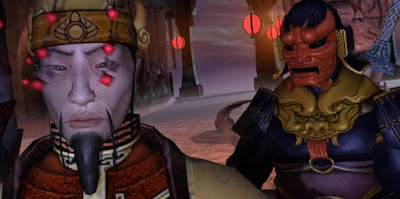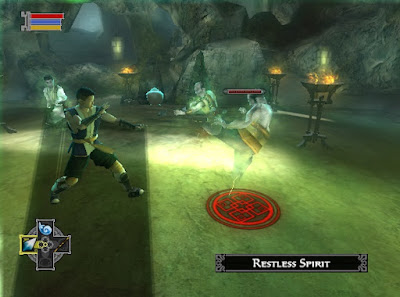THE PLOT:
The Grey Wardens are an order sworn to defend the world of Thedas from Blights, which occur when the normally subterranean Darkspawn emerge under the control of an archdemon to attack the surface world. Only the Grey Wardens possess the unique abilities to kill the archdemon and end the Blight. But it has been four centuries since the last Blight, and the Grey Wardens lack the numbers and respect they once commanded.
Now the Darkspawn have begun invading the surface again, in the southern part of the kingdom of Ferelden. However, Ferelden has only recently gained its independence from the aristocratic Kingdom of Orlais, and when King Cailan discusses requesting aid from the Orlesian Grey Wardens, his ranking general - Teyrn Loghain - becomes convinced that Orlais will use this as an excuse to retake Ferelden, which leads Loghain to drastic action.
Soon Cailan is dead, along with most of the Ferelden Grey Wardens. The remaining Wardens have been branded traitors. Loghain has taken control of the country, though resistance from several nobles has left Ferelden on the brink of civil war.
Leaving only two Grey Warden survivors and those strays they pick up along the way to somehow find enough support to fight back the Darkspawn, destroy the archdemon, and end the Blight!
 |
| Alistair, one of the last surviving Grey Wardens, receives advice from the aged witch, Flemeth |
CHARACTERS:
At first glance, most of the characters seem like 2-dimensional types. Over the course of the game, they gradually reveal enough additional depth to emerge as more than just plot pieces. This is particularly true of the game's villain, Loghain, who does several terrible things... but not without well-founded motivations. Ferelden independence is still very new, and Loghain's memories of being all but a slave to the Orlesians burned themselves into him. In one scene, he cries out against the nobles who refuse to support him: "Which of you stood against the Orlesian emperor when his troops flattened your fields and raped your wives?" In another conversation you can potentially unlock, he describes watching Orlesians "beat an old farmer to death with a riding crop. To this day, I don't know why."
Oddly, none of the actual main companions has as much depth as the villain does, though most of them work well enough. I genuinely enjoyed all my interactions with spy-turned-Chantry servant Leliana and cynical mage Morrigan. I initially enjoyed Alistair's snark... until it became apparent that underneath his humorous quips was an aggravating tendency toward self-pity. Banter with flirtatious assassin Zevran was fun, and I laughed out loud at the golem Shale's eagerness to "squish" enemies and pigeons with equal zeal.
Less enjoyable was the romance mechanic. At this point in Bioware's history, they had discovered that gamers responded well to romance being woven into the stories. However, they had yet to actually mark which dialogue options were "flirting." As a result, despite my Dwarf Noble romancing Morrigan, I ended up accidentally triggering a romance with Leliana on two separate occasions. How? By picking dialogue options that amounted to saying that she was a good person. Thus dooming me to lose "approval points" with her when I started a new conversation to "break up" with someone I never intended to be in a relationship with in the first place.
*thunks head on desk*
 |
| Good King Cailan meets a very bad end... |
GAMEPLAY:
Two items that have less to do with this 2009 game in itself and more to do with returning to an XBox 360 game after having become accustomed to more recent fare: (1) The load times feel veerrry long; (2) The maps, which seemed huge when I first played in 2012, now are startlingly cramped!
Those are just age issues, though - The maps are actually well-structured, maximizing the usable space by building corridors that either twist in and out from a main path or - in the case of one early town you visit and save - involve smart use of vertical architecture.
I am not a fan of Dragon Age: Origins' combat. It's busy, with you basically having to constantly pause to swap between characters, using the radial menus to issue commands and cast spells. Of course, you can let the combat play out in real time and trust your party members' AI to fight; but if you do that, your party members will be reliably stupid and even suicidal. A lot of the time, surviving a tough combat comes down to keeping your mage alive so that he/she can keep healing everyone. That, and never letting more than a second of "real time" to pass before selecting another set of options. It may be tactical, but to my tastes at least it isn't particularly fun.
 |
| My origin point for this playthrough: The Dwarven City of Orzammar. |
THOUGHTS:
After Bioware achieved success with Baldur's Gate, Neverwinter Nights, and Knights of the Old Republic, the company wisely decided to introduce some original properties. The RPG/martial arts mashup Jade Empire failed to connect with an audience (a crime, as it's a terrific game in its own right). Their other two original titles performed better, however: Mass Effect in 2007 and, of course, Dragon Age.
Dragon Age: Origins is aptly named. Not only is it the first game in a series that has gone on to span three large-scale RPGs and one expansion that almost qualifies as a game in its own right; it also allows players to select one of six unique origin stories. This effectively allows for six playthroughs in which the first 1 - 2 hours will be completely different. In addition, the origins span different races, locations, and social circumstances, which impact how NPCs react to your character throughout the game. So right from the start, you can see that this is an ambitious title.
 |
| The Archdemon. Because in a game called Dragon Age, you're going to fight at least one dragon. |
DECISIONS, DECISIONS...
At each major location your party visits, you will be called upon to make several choices. Some are minor: Will you involve yourself in the plight of a pair of elven lovers - or, potentially, dally with one of the would-be couple yourself? Others have more wide-ranging impact, where a choice can affect the direction of a culture, or even lead to the deaths of innocents.
In many cases, it's clear which choices are morally right and wrong; "good guys" don't generally sell people into slavery, condemn innocents to suffer eternal curses, or encourage massacres. There are a couple of intriguing exceptions, however, in which options will be provided in which all choices have good and bad sides to them.
The best example is the power struggle in the dwarven city of Orzammar. The king has died, and the council is deadlocked over which of two candidates should succeed him. Prince Bhelen is the king's son, and has ambitions to strengthen the city's ties to the surface and to reform the city's rigid caste system. Lord Harrowmont, his rival, is a rigid traditionalist who would isolate the dwarves more than ever before.
This seems like a no-brainer, save for one problem: Character. Harrowmont is a genuinely decent, honorable man. Bhelen is a snake, who likely killed his older brother and possibly his own father to get himself in line for the throne. I played a Dwarven Noble, meaning that I was Bhelen's other brother... and the victim of a frame-up, made to take the blame for his crimes. You get to decide which man takes the throne: A good man whose rule will be disastrous for the city; or a bad man whose ideas are exactly what dwarven society needs to endure. The game doesn't cheat on this choice. Crown Bhelen, and he will instantly show his colors as a tyrant... but the game's epilogue will affirm that his rule is good for the dwarves. Choose Harrowmont, and he will be suitably gracious... but the epilogue will reveal that his rule goes on to be generally chaotic and divisive.
The game cheats on another tough choice. A potential ally's young son has been possessed by a demon, which has inflicted devastation on the castle and the nearby village. You are given two options: Save the boy at the cost of another's life, or kill a child in order to save the village and at the same time end his own suffering. A third option is to travel to the Circle of Magi and bring back help to save the boy without having to sacrifice anyone. This means leaving both castle and village at the demon's mercy for the length of the journey, though, which really should have consequences.
There are no consequences to leaving the village - despite the fact that you'll have to go through several hours of gaming (presumably translating to days for the characters) in order to be in a position to return with magical help. I would give the game so many points if you returned to find the village devastated or the castle's inhabitants slaughtered. Instead, it's as if you had never left. I repeat: a cheat.
Choices do add up across the game. Your decisions will potentially affect the makeup of your army at the climax, as well as the attitude of your companions toward your leadership. Finally, there's an epilogue presented via text cards that reveals the impact of your decisions on the game world - and the potential endings for the various characters and settings are remarkably different depending on the path you choose. More than a decade after release, that remains impressive.
 |
| Your forces march to battle. |
OVERALL:
The graphics are dated and the combat is clunky, but time has largely been kind to Dragon Age: Origins. The story is typical epic fantasy fare, but the characters are sufficiently well-drawn to bring it to life. The cultures of the various nations, races, and classes are carefully detailed, and a substantial amount of drama is wrung from the ways characters of different backgrounds interact. An elf will be automatically looked down upon; a mage will be regarded with suspicion and fear; a non-magical human will suffer none of those disadvantages. With an impressive voice cast and a superb music score, it remains easy to get swept away.
Overall Rating: 9/10.
Dragon Age: Origins - DLC
Next Game: Dragon Age Origins - The Awakening
Review Index
To receive new review updates, follow me:
On BlueSky:
On Threads:











